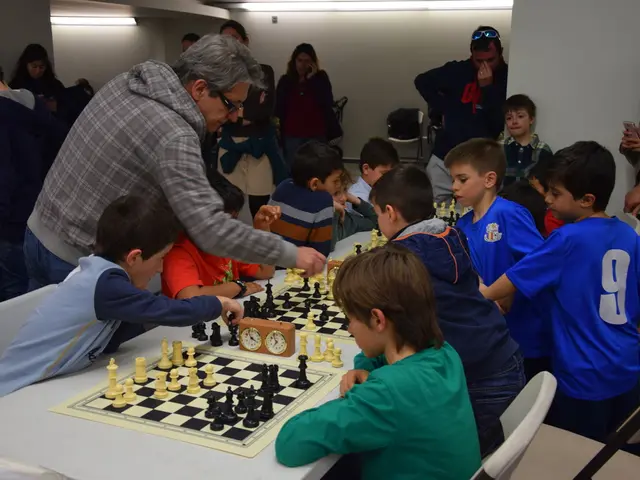Preparing for the Infant's Initial Steps: A 10-12 Month Plan
==============================================================
As your baby reaches the 10-12 month milestone, an exciting period begins - the journey towards their first steps. Here are some strategies to help your little one take their first independent steps safely and joyfully.
Allow and encourage pulling up and cruising
Your baby will likely start pulling themselves up on furniture and begin cruising (walking while holding onto support) during this period. Ensure furniture is stable and safe, and lower crib mattresses to prevent falls as babies start standing 1, 3, 5.
Use motivating toys to prompt movement
Place colourful or favourite toys just out of reach to encourage your baby to stand and take steps towards them. Push toys or toys that can “run ahead” also stimulate walking attempts 4.
Teach safe standing and sitting transitions
Show your baby how to bend knees and sit down gently from standing to avoid abrupt falls and injuries [4].
Avoid walkers
Baby walkers can restrict natural movement and pose injury risks, so it’s advisable to avoid them for babies learning to walk [4].
Incorporate varied physical activities
Activities like tummy time strengthen neck, shoulder, and arm muscles; crawling over ramps, tunnels, or gentle bumps improves coordination; and dancing or gentle movement with music enhances balance and rhythm 2.
Provide plenty of floor time
A safe, open space where babies can move freely helps them explore different gross motor skills like crawling, pulling to stand, and cruising 1, [2].
Be patient and supportive
Not all babies walk between 10-12 months; some take longer, including preterm infants. Avoid forcing walking to prevent frustration or injury, and consult a pediatrician if concerns arise [4].
In addition to these strategies, promoting self-help skills by encouraging self-feeding, dressing, and basic clean-up tasks also supports your baby's growing independence.
Remember, every baby progresses at their own pace, so patience and understanding are key. Cheer your baby on, celebrate their milestones, and enjoy this wonderful journey together!
References:
- CDC: Positive Parenting Tips for 10-12 Months
- National Center on Early Childhood Development, Teaching, and Learning: Promoting Infant and Toddler Development: The Importance of Physical Activity
- American Academy of Pediatrics: Safe Sleep: Reducing the Risk of SIDS and Other Sleep-Related Causes of Infant Death
- Healthy Children: Helping Your Baby Walk
- BabyCenter: When Can Babies Start Walking?
- Emotional development is crucial during this period as your baby takes their first steps, requiring lots of encouragement and patience from parents.
- Apart from walking, promoting self-help skills like self-feeding and dressing fosters independence in kids.
- Family relationships are strengthened as parents guide their toddler through the initial steps of walking.
- The journey towards a child's first steps involves learning social skills, like sharing toys with siblings or friends during playtime.
- Ensure that your home environment is child-friendly to prevent accidents during the learning stages of walking.
- As your baby transitions from crawling to standing and walking, it's essential to focus on their health and wellness, paying attention to any medical-conditions that may affect development.
- Good nutrition plays a significant role in a child's overall development and is important as they begin taking their first steps.
- Fashion and beauty can contribute to building a child's confidence during this phase, as they show off their new skills in stylish clothes and shoes.
- As your child's emotional needs evolve, it's essential to pay attention to their behavior and respond appropriately to foster positive interactions within the family.
- The development of learning and cognitive skills goes hand-in-hand with walking and physical activity, as a child explores and interacts with the world around them.
- With the help of proper education and self-development resources, parents can ensure they provide the best strategies for their child's physical and emotional growth.
- To ensure a child's safety during the learning process, it's crucial to keep potential hazards like sharp objects or unstable furniture out of their reach.
- Incorporating science and creativity into playtime, such as building towers from blocks or learning about the weather, supports a child's cognitive development.
- As your child learns to walk and explore the world, they will require a variety of toys and activities to stimulate different learning and motor skills.
- Developing good habits early, like regular sleep schedules and bedtime routines, are essential for a child's overall health and well-being.
- As your baby grows and learns to walk, engaging in outdoor activities like travel, visiting parks, and exploring new environments expands their worldview.
- The growth of a child's independence and independence can lead to alterations in family dynamics and relationships, requiring parents to adapt along with their growing child.
- As you navigate this exciting period, remember that pets and specialized lozenges for sore throats can help soothe and comfort your child during times of sickness or anxiety.




